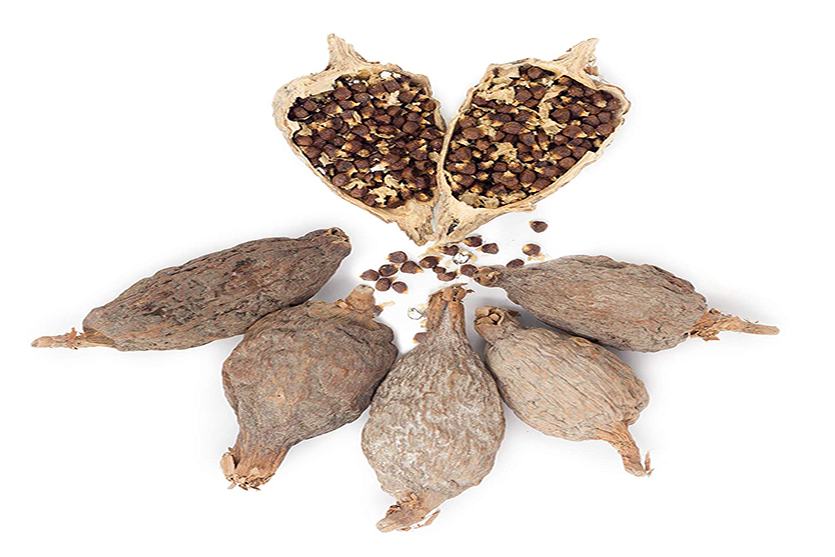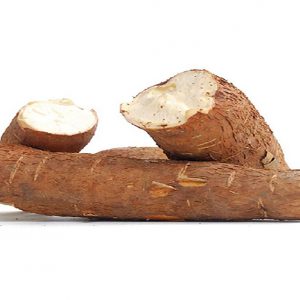Alligator Pepper
Aframomum melegueta is a species in the ginger family, Zingiberaceae, and closely related to cardamom. Its seeds are used as a spice; it imparts a pungent, black-pepper-like flavor with hints of citrus. It is commonly known as grains of paradise, melegueta pepper, alligator pepper, Guinea grains, ossame, or fom wisa.
The plants which provide alligator pepper are herbaceous perennial flowering plants of the ginger family (Zingiberaceae), native to swampy habitats along the West African coast. Once the pod is open and the seeds are revealed, the reason for this spice’s common English name becomes apparent as the seeds have a papery skin enclosing them and the bumps of the seeds within this skin is reminiscent of an alligator’s back.
As mbongo spice, the seeds of alligator pepper are often sold as the grains isolated from the pod and with the outer skin removed. Mbongo spice is most commonly either A. danielli or A. citratum, and has a more floral aroma than A. exscapum (which is the commonest source of the entire pod).
It is a common ingredient in West African cuisine, where it imparts both pungency and a spicy aroma to soups and stews.
Product Name: Alligator Pepper
Botanical Name: Aframomum melegueta
Tariff – HS Code: 85366990
Local Productions: Approx 2,200,000 tonnes/Yrly
Quality Standards
Aframomum melegueta, a phyto-additive has been reported to have anti-oxidizing, anti-microbial, and flavor enhancing properties. The aim of this trial was to assess the efficacy of Aframomum melegueta in terms of growth performance, carcass quality and organoleptic indices of weaner rabbits (mixed breed and unsexed) fed two dietary protein levels with or without Aframomum melegueta seed meal (APSM). Six experimental diets were formulated such that diets A, B and C contained 18%CP and 0%, 0.1%, 0.2% APSM, respectively while diets D, E and F contained 16%CP with 0%, 0.1% and 0.2% APSM, respectively. Thirty-six weaner rabbits were allotted into the 6 dietary groups of 3 replicates each and two rabbits/replicate in a study lasting 8 weeks. Daily Weight Gain (DWG), Daily Feed Intake (DFI), Feed Conversion Ratio (FCR), carcass characteristics and sensory qualities were monitored. Data collected were analysed using a 2×3 factorial arrangement in a completely randomized design. Proximate composition of APSM on dry matter basis showed crude protein 6.39%, crude fat 7.10%, crude fibre 14.53%, ash 3.05% and nitrogen free extract 59.76%. The phytochemical constituents present are saponin 7.5%, tannin 0.021%, flavonoid 10.10% and alkaloids 1.70%. Findings showed that the main effects of protein levels and APSM did not elicit any significant differences (P>0.05) on DFI, DWG FCR and meat sensory attributes. Inclusion of APSM in rabbit diets caused a reduction in abdominal fat contents. Interaction between protein and inclusion levels of APSM did not reveal any significant variations except on apparent adhesion. In conclusion, the use of alligator pepper had no adverse effect on growth performance and carcass traits while 16% dietary protein level appeared better utilized compared to 18% in weaner rabbit diets.
Specifications
Package
Plastic pouches and bags, glass and plastic bottles.
Uses
Alligator pepper is a worm expellant, a diuretic; it heals wounds and treats malaria. Traditionally, it is used to treat fibroids, gastrointestinal disorders and it is good for dermatological care. It also has analgesic and anti-inflammatory properties.



Reviews
There are no reviews yet.